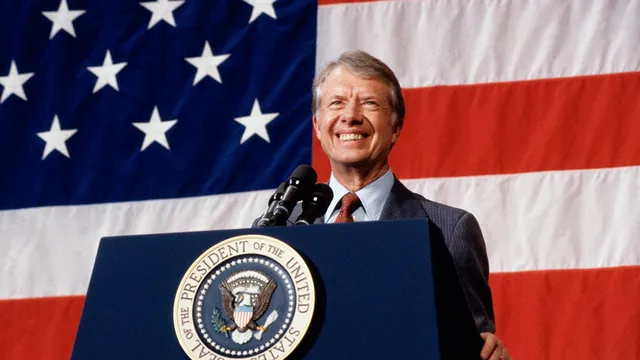
Presidents unite at Jimmy Carter's funeral in Washington, D.C
2025-01-11 00:00- Jimmy Carter, the 39th president of the United States, passed away on December 29, 2024, in his hometown.
- A state funeral held on January 9, 2025, brought together all five living former presidents at the National Cathedral in Washington, D.C.
- The unique gathering highlighted Carter's legacy and the importance of his character in American history.
Express your sentiment!
Insights
In the United States, a significant event took place on January 9, 2025, as former President Jimmy Carter was laid to rest at the Washington National Cathedral after passing away at the age of 100 on December 29, 2024. The funeral drew a remarkable gathering, including all five living former presidents: Joe Biden, Barack Obama, George W. Bush, Bill Clinton, and Donald Trump. Following memorial services held at various locations including the U.S. Capitol and the Carter Presidential Center, the ceremony served not only as a tribute to Carter's life but also as a rare occasion for the former presidents to come together in remembrance. Joe Biden delivered a heartfelt eulogy that emphasized Carter's enduring character and impact on the world, especially highlighting how his actions resonated with people globally. Biden noted that Carter always focused on serving others and making a positive difference, reflecting his deep Christian faith and commitment to humanitarian work. Throughout the ceremony, attendees observed moments of warmth and camaraderie among the former presidents, including a friendly exchange between Trump and Obama, a rare moment given their contentious political history. Despite the somber occasion, the atmosphere also had lighter moments, generating a mix of emotions as many gathered to celebrate Carter's legacy. His family was present, with three grandsons delivering tributes and sharing personal anecdotes. Emotional acknowledgments of care provided by caregivers and community members highlighted Carter's appreciation for those who supported him through life. Following the funeral in D.C., Carter's remains were to be transported to his hometown of Plains, Georgia, for a private burial service, emphasizing his lifelong ties to this community he cherished. The gathering of multiple former presidents is notable, as it reflects the unifying force of funerals in American political history, where rivals often set aside differences to honor a departed leader. The moment was particularly profound, considering the divisions within the current political landscape. Despite previous tensions, the presence of all living presidents at Carter’s funeral served as a reminder of their shared experiences and contributions to the nation’s story, illustrating how the spirit of respect can prevail even amidst political differences.
Contexts
Jimmy Carter, the 39th President of the United States, served from 1977 to 1981, and his role in U.S. politics is marked by a commitment to human rights, diplomatic efforts, and significant domestic challenges. He was a Democratic governor of Georgia before his presidency, where he championed reforms in health care, education, and government transparency. His presidential campaign emphasized a return to moral leadership and integrity in governance, contrasting sharply with the Watergate scandal that marred the Nixon administration. Upon taking office, Carter faced various issues, including an energy crisis, economic inflation, and international tensions, which significantly shaped his presidency and legacy in American political history. One of the hallmark aspects of Carter's presidency was his emphasis on human rights, which he integrated into U.S. foreign policy. He believed that promoting human rights was integral to American values and global leadership. This approach led to strained relationships with countries like Argentina and Iran, where human rights abuses were rampant. Carter's administration brokered the Camp David Accords, which resulted in a peace treaty between Egypt and Israel in 1979, a significant achievement in Middle Eastern diplomacy. This agreement not only earned Carter a Nobel Peace Prize in 2002 but also established a precedent for future U.S. involvement in peace processes in the region. Despite these diplomatic successes, Carter's presidency was plagued by challenges that ultimately limited his effectiveness and popularity. The Iranian Revolution in 1979 led to the U.S. Embassy hostage crisis, where 52 American diplomats and citizens were held hostage for 444 days. This event significantly impacted Carter's public perception and his chances for re-election. The economic troubles of the era, characterized by high inflation and unemployment known as stagflation, further undermined his administration. His efforts to address these issues, including the establishment of the Department of Energy and the Department of Education, were often viewed as insufficient in the face of growing public dissatisfaction. After leaving office, Carter remained active in politics and humanitarian work, founding the Carter Center in 1982, which focused on global health, education, and democracy promotion. His post-presidency era solidified his reputation as a moral leader, as he worked on various humanitarian projects and served as an elder statesman. Through his long-standing involvement in civic and political issues, Carter has continued to influence U.S. politics, advocating for peace, health, and human rights. His presidency, while seen as tumultuous during his time in office, has been reassessed over the years as significant for its moral clarity and dedication to social issues, establishing him as a unique figure in American political history.